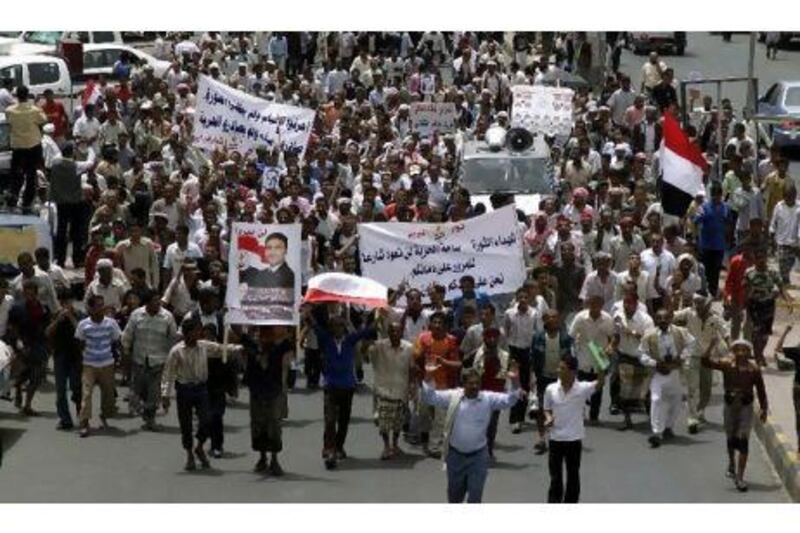SANA'A // The caretaker Yemeni government is under pressure to cede power during the absence of the country's injured president, Ali Abdullah Saleh, and various groups are jockeying for positions in the new power structure that could emerge.
The acting head of state, vice-president Abdo Rabu Hadi, is fielding demands from religious leaders, opposition groups, youth protesters and the international community to form a joint transitional government, a senior aide to the vice president said yesterday.
"Vice-president Abdo Rabu Hadi was given a short deadline to reach agreement between political factions and he is taking this seriously," the aide said.
Even so, the fractious nature of the country's political arena has made the composition of any new government, or even the transitional council, increasingly complex.
As Tawakkol Karman, a leader of Yemen's democratic youth movement, wrote in an opinion piece for Saturday's New York Times, "Following months of peaceful protests that reached every village, neighbourhood and street, Yemen is now facing a complete vacuum of authority; we are without a president or parliament. Mr. Saleh may be gone, but authority has not yet been transferred to a transitional presidential council endorsed by the people."
Although Mr Saleh is in Saudi Arabia, where he is recovering from wounds suffered in an assassination attempt on June 3, his family and supporters still control what remains of the government.
According to critics, what remains is not much. Witnesses in Sana'a said streets are not secure because of roaming gunmen, shops have closed, and rubbish is piling up in every street. They said electricity is cut throughout the day, petroleum and diesel are impossible to find, and tens of thousands have lost their jobs.
On Saturday, more than 100 influential religious clerics and tribal leaders called for Mr Saleh to step down and elections to choose a new leader, adding their weight to the opposition movement seeking to end nearly 33 years of autocratic rule.
Senior officials in the main opposition group, the Joint Meeting Parties, confirmed yesterday that the formation of the joint government is expected to be signed within weeks.
Both sides have accepted the concept of a joint transitional government to be divided evenly between Yemen's ruling party and main opposition. Parties left out of the two-sided power-sharing pact have expressed disappointment at the deal.
Hasan Zaid, the secretary general of the opposition Haq party, said: "No country in the world can survive without a government. Yemen has no government due to the presidential palace attack and this cannot continu. The new government will be formed very soon and the political wheel in Yemen will start moving again with the absence of President Saleh."
According to Zaid Thari, a ruling party political adviser, the US ambassador, EU ambassador and Saudi and Gulf Cooperation Council officials are all putting pressure on the vice president and opposition JMP to agree to a joint transitional government.
Mr Zaid if no government is formed within the next two weeks, militants and armed gangs will turn the country into a lawless state.
In the past, world powers have warned that a void in governance could only increase the threat of terrorist organisations such as al Qa'eda.
Mohammed Basendowah, the president of the opposition dialogue committee, said: "The US ambassador is worried that the ongoing political crisis will make terror groups stronger and raise the insecurity in the country."
At least 12 militants and four soldiers were killed in two clashes yesterday in southern Yemen, where Islamists and separatists have launched several attacks during the country's bloody political crisis.
Mr Hadi has insisted that the situation in the country must be stable before any government is formed.
"A transition government is a must, but please help me bring life back to normal in Yemen and ensure security before that can happen," Mr Hadi told the opposition parties when he met with them earlier last week.
Senior officials in Yemen's ruling party said that the vice president is having difficulty convincing the ruling General Peoples Congress party to agree to a unified transitional government.
Mr Thari said the ruling party is divided between those who stand with the vice president in going ahead with a transitional joint government and those who demand a stall in the political process until Mr Saleh is back in Yemen.
Opposition parties also have their share of problems. Differences have arisen on how to divide the 50 per cent stake in government it receives among its many powerful allies.
Critics also believe that giving the ruling party 50 per cent of the transitional government is too much for a party expecting to see a strong downfall.
Ali Saif, chairman of the Political Development Forum, said: "One year from now, the ruling party will be ineffective. The party was led by a family. When the family leaves the political arena the party leaves as well."
Pro-democracy youth protesters represent another aspect to the political equation. They have to date emphasised that any transitional council be formed without the ruling party.
Waseem Qirshi, spokesperson for the revolution youth organising committee, in reference to the estimated 400 protesters who have been killed by government forces since protests erupted in January, said: "The council must not include the ruling party as it is behind the death and killing or hundreds of protesters.
"If the ruling party is involved in the next government, our revolution will go down the drain."





